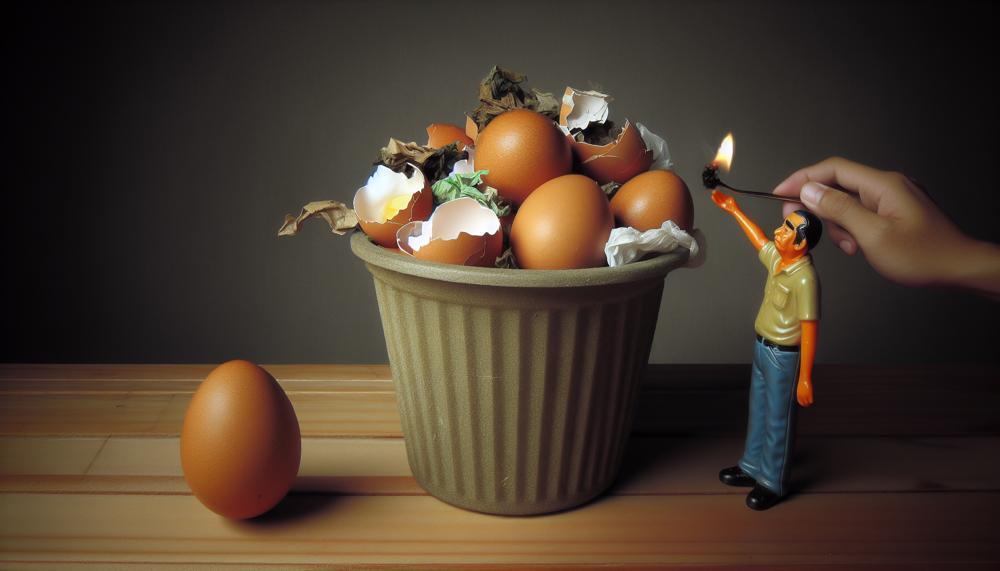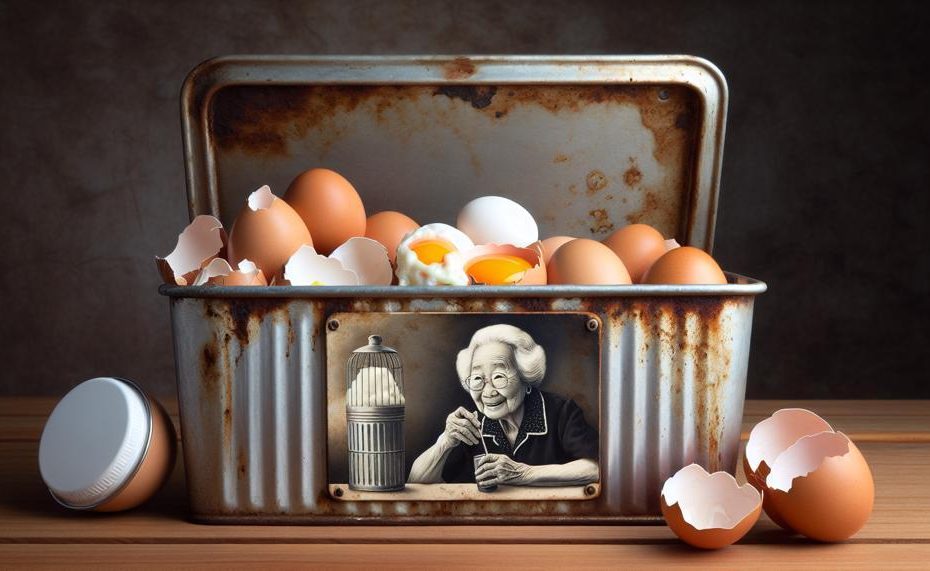Do you have a forgotten carton of eggs lurking in the back of your fridge, past their expiration date? Are you unsure of how to safely get rid of them without causing harm to the environment? Look no further, because we’ve got you covered.
When it comes to disposing of old eggs, there are a few important things to keep in mind:
- Eating expired eggs can lead to food poisoning, so it’s best to avoid consuming them.
- Tossing old eggs in the trash can create unpleasant odors and attract unwanted pests.
- The most eco-friendly way to dispose of old eggs is by composting or using them as fertilizer for your plants.
- If composting isn’t an option, wrapping the eggs in newspaper before throwing them away can help contain any potential mess.
- Never pour raw egg down the drain as it can clog pipes and harm the environment.
Now that you know the proper way to say goodbye to your old eggs, go ahead and clean out your fridge with peace of mind. Your future self (and Mother Nature) will thank you.
Contents
First Check If The Egg Has Gone Bad
Determining if an egg has gone bad is a crucial step before disposing of it.
Fortunately, there are numerous methods that you can use to determine the freshness of an egg. These include using your senses, such as smell and appearance, as well as performing simple tests like the float test and the shake test.
It’s important to keep in mind that consuming a bad egg may not necessarily result in harmful consequences, but it’s always best to err on the side of caution and dispose of it to prevent any potential foodborne illnesses. In addition to these methods, there are also various ways you can dispose of expired eggs, such as through garbage or trash disposal, composting, or even recycling the eggshells as a natural fertilizer for your plants.
Properly handling and disposing of expired eggs is crucial for avoiding health hazards and reducing waste in our environment.
Second, Consider These Ways To Dispose Of Old Eggs
When it comes to getting rid of old eggs, there are numerous safe and effective techniques you can employ. These methods not only ensure proper disposal of expired eggs but also promote sustainability by recycling eggshells and cartons. Below are some options for safely disposing of old eggs:
- Tossing them in the trash or compost bin: This is the most common method of getting rid of old eggs. However, remember not to leave the trash bag inside the house, as the smell can linger.
- Utilizing the garbage disposal: If you have a garbage disposal in your kitchen sink, you can crack the eggs and pour the contents down the drain. Just be sure to avoid throwing in the shells as they can clog and damage your pipes.
- Donating them: If the eggs are still fresh and within their expiration date, consider donating them to local farms or animal shelters. They may accept them for livestock feed or other purposes.
- Adding them to a compost pile: Eggshells and expired eggs can be added to a compost bin or pile. This not only helps dispose of them, but also enriches the soil with calcium, which is beneficial for plants.
It is crucial to carefully check if the eggs have gone bad before disposing of them. Conducting a water test or checking for any unusual odor or color can help determine if they are still safe to consume. Additionally, according to FDA guidelines, hard-boiled eggs should be used within a week and frozen eggs should be consumed within a year.
When it comes to recycling, cardboard egg cartons can be added to compost piles or recycled. However, plastic or Styrofoam cartons should not be included. Furthermore, expired eggs that pass the smell and color test can also be repurposed for various uses such as cooking for pets or making skincare products.
In conclusion, there are several safe and effective methods for disposing of old eggs, including tossing them in the trash, using the garbage disposal, donating them, or adding them to a compost pile.
Safe And Odorless Disposal Of Old Eggs: A Double-Bagging Approach
The double-bagging method for disposing of old eggs is a simple but effective approach to ensure safe and odorless disposal. This technique involves placing the old eggs in not just one, but two layers of plastic bags before throwing them away.
This may seem like an extra step, but it can make a big difference in preventing any unpleasant odors from spreading. By using two layers of plastic bags, you are creating a barrier that helps contain the smell and prevents it from escaping into your home or trash bin.
But why is it important to ensure safe and odorless disposal of old eggs in the first place? Well, let’s start with the obvious: no one wants to deal with a stinky and messy trash bin or garbage can. It’s not only unpleasant but can also attract pests and insects, creating a potential health hazard.
Moreover, improperly disposing of old eggs can also have negative impacts on the environment. When eggs decompose, they release ammonia gas, which can be harmful to plants and animals. By using the double-bagging approach, you are not only protecting yourself from foul odors but also doing your part in preserving the environment.
Now, let’s talk about how this method can be useful in real-life situations. Imagine you have a busy week ahead, and you’re trying to clear out your fridge before going grocery shopping. You come across some old eggs that have been sitting in your fridge for too long and have started to smell. Instead of simply tossing them in the trash bin, the double-bagging method allows you to dispose of them safely without worrying about any lingering odors.
In conclusion, although it may seem like a small step, the double-bagging approach can have significant benefits when it comes to disposing of old eggs.
Turning Old Eggs Into Fertilizer
Don’t let old eggs go to waste. Instead, turn them into fertilizer to provide your garden with essential nutrients. Here are some tips on how to safely use old eggs as fertilizer for gardening purposes:
Eggshell Tea
Create an eggshell tea by boiling the eggshells in water, then letting it cool. Transfer the liquid into a bucket and steep for 24 hours. This tea can then be poured around the base of plants, giving them a boost of calcium and other minerals.
Eggshell Powder
Another method is to dry the eggshells and grind them into a powder using a blender. Spread this powder around the base of plants and work it into the soil. Eggshells are rich in calcium, which helps with plant growth and strength.
Egg Mixture
Mix equal parts egg whites, yolks, and water to create a nutrient-rich fertilizer. Apply a thin layer around the base of plants for optimal growth.
Calcium-Rich Water
Crush eggshells into a powder and add water to create a calcium-rich liquid that can be used to fertilize plants. Let the shells sit in the water for a few hours until the minerals dissolve, then pour the chalky water around the base of plants.
By using old eggs as fertilizer, you not only reduce waste, but also provide your garden with vital nutrients.
What To Do With Expired Eggs?
When eggs have passed their expiration date, there are several safe and practical ways to dispose of them. These methods include using a garbage disposal, throwing them in the green waste bin, or composting them. Below is a breakdown of these methods and how to properly dispose of expired eggs.
Using a Garbage Disposal:
- This method is most suitable for small quantities of expired eggs.
- It is important to note that only raw eggs should be placed in the garbage disposal, as eggshells can clog and damage pipes.
- Simply turn on the garbage disposal and run cold water while slowly adding the expired eggs.
- Once all the eggs have been disposed of, run the garbage disposal for a few more seconds to ensure everything is fully flushed out.
Throwing Them in the Green Waste Bin:
- For larger quantities of expired eggs, they can be thrown in the green waste bin.
- Be sure to wrap the eggs in a plastic bag before placing them in the bin to prevent any unpleasant odors.
- This method is not recommended for hot or humid climates as it may cause the eggs to spoil quickly and attract pests.
Composting:
- Composting is a safe and environmentally friendly way to dispose of eggshells and expired eggs.
- Check with local authorities for any specific regulations or guidelines before composting.
- Eggshells can be added to compost as it provides calcium to the soil, but plastic or Styrofoam cartons should not be included.
- To compost expired eggs, break them up and mix them with other compostable materials such as leaves, grass clippings, and kitchen scraps.
- Make sure to regularly turn the compost pile to ensure proper decomposition.
In conclusion, there are multiple safe methods for disposing of expired eggs, including using a garbage disposal, throwing them in the green waste bin, or composting them. It is essential to follow these methods to prevent unpleasant odors and potential hazards. Additionally, egg cartons can be recycled or composted, but it is crucial to thoroughly clean and dry them before doing so.
What Happens If You Eat Old Eggs?
Eating expired eggs can have serious health consequences due to harmful bacteria. To mitigate these risks, it is essential to dispose of old eggs correctly by sealing them in bags or using them as pet food. These simple measures not only safeguard our well-being but also help reduce food waste, creating a win-win scenario for both our health and the planet.
Unfortunately, many people are unaware of the potential dangers of consuming old eggs. As a result, they may unknowingly consume contaminated eggs, putting their health at risk. This is why it is crucial to spread awareness about the importance of properly disposing of old eggs.
One way to ensure the safety of our bodies is to throw away any expired eggs in sealed bags. This prevents any potential bacteria from spreading and contaminating other food items. Another option is to use the eggs as pet food, which not only eliminates any risk of consuming them but also reduces food waste.
Properly disposing of old eggs not only protects our health but also has a positive impact on the environment. By reducing food waste, we can help minimize the resources and energy used in food production, leading to a more sustainable future.
In conclusion, it is crucial to dispose of old eggs properly to avoid potential health risks and contribute to reducing food waste. By following these simple steps, we can protect ourselves and the planet, making it a win-win situation for everyone involved.
Egg’s Standard Shelf Life
Eggs, a kitchen staple in most households, have a standard shelf life of four to five weeks when stored properly in the refrigerator. However, for maximum freshness and quality, it is recommended to use them within two weeks. This timeframe is crucial not just for maintaining the eggs’ quality, but also for safe disposal as expired eggs can pose serious health risks if consumed.
How long do eggs last?
The standard shelf life of eggs is four to five weeks when stored in the refrigerator. However, this timeframe varies depending on how well the eggs are stored and handled.
How to properly store eggs
To ensure maximum freshness and quality, it is essential to store eggs properly. Refrigeration is key to preserving their shelf life. Eggs should be kept at a temperature of 40°F or below to prevent bacterial contamination.
Impact of expiration on safe disposal process
Expired eggs can pose health risks if consumed, making proper disposal crucial. Consuming an expired egg can lead to food poisoning, resulting in symptoms such as nausea, vomiting, and diarrhea. To reduce the risk of foodborne illness and food waste, it is important to dispose of expired eggs properly.

| Shelf Life | Storage Method | Impact on Safe Disposal Process |
| 4-5 weeks | Refrigerator | Properly disposing of expired eggs reduces health risks and food waste. |
| 2 weeks | N/A | Eggs are freshest when used within two weeks of purchase. |
Possible areas for further detail:
- How to tell if an egg is spoiled
- Why refrigeration is crucial for storing eggs
- Different storage methods for eggs (e.g. storing in a carton vs. egg holder)
- What to do if you accidentally consume an expired egg
Conclusion
In conclusion, it is crucial to properly dispose of old eggs for the sake of our health and the environment. Consuming expired eggs can lead to food poisoning, while throwing them in the trash can create unpleasant odors and attract pests.
To minimize our impact on the planet, we can opt for eco-friendly methods such as composting or using them as fertilizer for plants.
If composting is not feasible, double-bagging or wrapping the eggs in newspaper before discarding them can contain any potential mess. It is also important to avoid pouring raw egg down the drain as it can clog pipes and harm aquatic life.
By following these simple yet effective tips, we can ensure safe and responsible disposal of old eggs while also reducing food waste and promoting sustainability.





